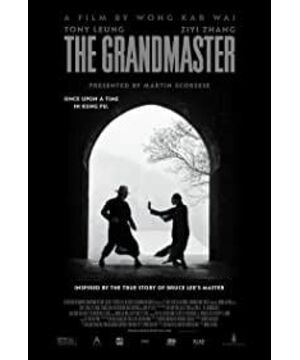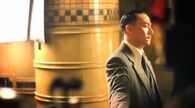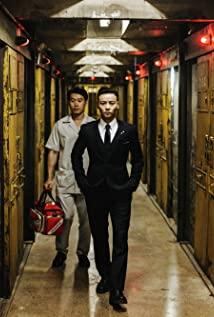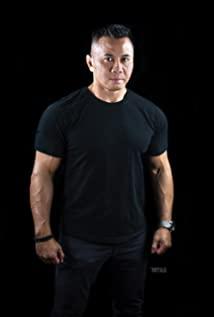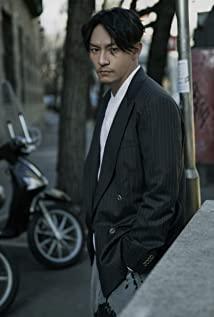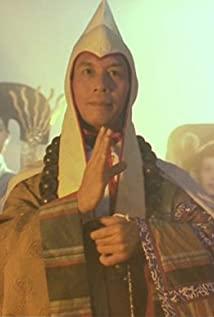Jinquan-"The Great Master", "The Great Master" has just announced a trailer. The biggest difference between this trailer and the previous version is that it appears to be a "real person appearance" on the surface, but in fact, except The subtext tells the audience that "Wang Jiawei's masterpiece of Kung Fu has finally begun to move from the production stage to the marketing stage", and the rest is still looking at the flowers in the mist. This is also like Wong Kar-wai behind sunglasses, making it difficult to probe his deep heart.
In other words, I personally like the initial concept trailer very much. It gives people endless reverie, "The martial arts are passed on by chivalrous men, and the rivers and seas are literally written in history; Dao will last forever because of love, and the master of the generation of proofs", be this one. The large ink-and-wash characters bloomed in the picture, not only named the narrative theme of the film (wu, chivalry, Taoism, love), but also vividly and vividly like the martial arts moves like unwinding and unfolding and smoothing the sand. This kind of literary synaesthetic martial arts technique has been described by Jin Yong in "The Legend of the Dragon Slaying the Dragon" (see the passage of Zhang Sanfeng's contribution to Zhang Cuishan in words), but his appeal to images reflects Wang Jiawei's full artist style.
This new version of the trailer also well reflects the characteristics of Wong Kar-wei's coexistence of reality and fiction, and surprises in the chaos. It really doesn’t look like a trailer. The conventional methods of displaying stories, star lineups, director information, etc. in traditional movie trailers have been discarded; it’s more like a pure but mysterious visual art. Pin, only intercepted a scene of Tony Leung fighting in the rain (the scene was actually filmed for three months), and enhanced the genre of the film with rich and colorful image creation, high-contrast lighting techniques, and dance-like body shaping Features and commercial selling points. Otherwise, we cannot know more.
Perhaps the "no expectation" for Wong Kar Wai's works is the "biggest expectation" for Wong Kar Wai.
From this, I also think of the martial arts master Hu Jinquan. In my opinion, in today's impetuous and frothy market environment, Wong Kar-wai has become more and more of the artistic style that Master Hu was not surprised at back then, and I was self-conscious. First of all, both of them are everyone in the style of images. Hu Jinquan once said: "I think for a movie, the theme does not matter, nor does the story matter. The quality of the story and the theme are not enough to affect a movie. The most important thing in a movie is the performance skills." (see "Hu Jinquan Movie Legend" ", Hong Kong: Ming Pao Publishing House, 2007) The film author style illusioned by film techniques is the key to the director's safety and destiny, and it is also the temperament that mainland directors lack the most for a long time (I think this is related to the realist creative atmosphere in the mainland).
For example, in the performance of kung fu, Jackie Chan’s jumping up and down is a style, Liu Jialiang’s flying flowers and splashing is a style, while Wang Jiawei and Hu Jinquan are quite similar, showing that they are not interested in martial arts moves themselves (see " "Hu Jinquan Martial Arts Script Writing", Hong Kong: Text Society, 1998), and emphasizes the artistic and dance treatment of martial arts. Hu’s video experiments in "Xia Nu" and "Loyalty" are not kung fu, but editing; similarly, what is shown in the trailer of "The Great Master" also relies more on editing to show the strength of martial arts. And beauty. It should be understood that real Kung Fu is not really attractive in visual presentation (for example, the Kung Fu competition in the CCTV "Wulin Conference" is far from the audience's usual cultural imagination of Kung Fu), so "True Kung Fu" is advocated in movies. "In fact, there is not much necessary. Even martial arts people like Liu Jialiang have to make some "crab punches" for Kurata Yasuaki when filming "Chinese Husband" to increase the appreciation. Highlighting the style from the composition and editing of images is an important manifestation of Wong Kar-wai's artistic personality.
In terms of grinding foreign workers, Wang Jiawei seems to have received the "true biography" of Hu Jinquan. After Hu Jinquan’s "Swordsman" was tossed for 5 years, he finally forced the wealthy federal boss Sha Rongfeng to jump and complain: This director Hu was too unreliable and said that he wanted to shoot me the new film "Lingshan Sword and Shadow", but finally got " "Xia Nv (Part 2)" changed its name ("The Memoirs of Sha Rongfeng", Taipei Film Archive, 2006); Hu went to South Korea to film "Legend of the Mountain", so the famous actor Sun Yue spent a whole year, In the meantime, he was injured in a car accident, and as a result, there was not a single shot left in the release version. On this point, Wong Kar-wai seems to be no less than Hu Jinquan. His "history of destruction" of big stars can write a big book; his "A Fei Zheng Chuan" (rated by professional institutions as the best work in Hong Kong film history) has made Deng Guangrong lose Disastrous; his "2046" was filmed for 5 years, and Zhang Zhen's scenes were almost completely cut off; "The Great Master" began planning in 2002, and the filming was delayed for more than two years, during which time it was rushed to shoot by other companies I wrote three Ye Wen operas—but this kind of "old literati" style of excellence and perfection has penetrated into the bones of these artists: the works may not be profitable but are enough to be handed down to the world. This is actually a multi-party game between investors, creators and movie viewers. Looking around since the 1980s, no director in Hong Kong has been able to maintain a uniform style and a consistent high level like Wong Kar Wai. Therefore, it is no accident that he became the darling of film critics and research circles.
Wang Jiawei and Hu Jinquan have a lot in common. For example, they all became famous at the Cannes Film Festival in France and have a worldwide influence. Hu Jinquan’s "The Chivalrous Girl" is the first Chinese film to win an award in Cannes. He himself was rated as one of the "Top Five Directors in the World" by the British media; "("Happy Together") Chinese-speaking director, his "In the Mood for Love" made Tony Leung the Cannes actor, and he served as the chairman of the Cannes Film Festival Jury...In addition, they all have excellent cultural and artistic accomplishments. Hu Jinquan is good at calligraphy. Many of his film titles are inscribed by himself, and many of the props are made by himself; similarly, the international poster of Wong Kar-wai's "The Great Master" is also designed by himself. The big characters were made by referring to the "combination collage" of famous copybooks of past dynasties. It seems that only by working on the details, Wong Kar-wai can truly feel at ease with his works. His top international film production team, under his baton, let his wanton artistic inspiration gradually shine into reality.
I said that Wang Jiawei is more and more like Hu Jinquan, mainly referring to his temperament as an artist. And focusing on the work itself, of course, there are obvious generational differences. Compared with other current directors, Wong Kar-wai uses a unique and adventurous and fascinating work path, which I call the "image structure of ideas" method. (I will discuss this in another article in the future) In the international film world, there are also directors who are good at "improvisation", such as Mike Lee, but they basically stay at the stage of performance and shooting, while Wong Kar-wai's "improvisation" "Throughout, including post-production. Wong Kar-wai's film first shoots a lot of material (the material sometimes seems fragmentary and irrelevant), and builds the idea structure and theme through a high degree of artistic intuition and inspiration. This makes Wong Kar-wai unique in the entire world film scene. His works are regarded as the representative of obvious "post-modern culture". The large amount of ambiguity in the film can be interpreted in many ways: Wong Kar-wai's film can be regarded as a complete interpretation of emotions and memories. It can also be regarded as a political allegory.
The dream of being a knight from ancient times, in retrospect, many directors have great aspirations to transform the genre of martial arts kung fu movies. For this type of nation that is deeply rooted in the public's psychology, it is not easy to transform it. In martial arts sword films, Wong Kar-wai, Lee An, Zhang Yimou, and Chen Kexin have all taken action, especially Wong Kar-wai’s "Evil and West Toxic" (authorized strategy) and Li Ang's "Crouching Tiger, Hidden Dragon" (differentiated strategy) ) The reputation is the best. They completely use two different art modes to successfully transform the martial arts sword film and achieve the same effect of Chinese and Western. In the field of kung fu movies, for a long time, a certain paranoid "face nationalism" narrative still dominates today and is recognized by businesses and the public. From the era of Bruce Lee, it was punching the East and kicking the West. It was like Jet Li in the 1990s. It was still in the 21st century "Ip Man" series, and it was still the same in last year's "Jing Wu Fengyun". My junior sister at Wen Wei Po in Hong Kong told me that Hong Kong audiences were excited when they watched the Japanese Devil movie, and "Ip Man" has naturally become the best film at the Academy Awards. However, if the genre of Kung Fu movies is to break out of the stereotypes of a powerful country in the new era and reappear in the past glory, major adjustments in narrative strategies are needed. Jackie Chan’s "Kung Fu Dream" has already made a good attempt at this, and Wong Kar-wai, in the planning stage of "The Great Master", found Zhang Dachun ("City Violence Group"), Xu Haofeng ("Dead Martial Arts", "Taoist Down the Mountain"), etc. The writer made a story plan, and tried to transform the Kung Fu film from the "fist catharsis" in the past to the exhibition of the martial arts ecology during the Republic of China. How to behave, I don't know, but I know it must be a whole new world of Kung Fu.
At this point, I thought of Master Hu Jinquan again, and of his unfinished career "History of Chinese Workers' Blood and Tears". He said that the filming of this film is definitely not to promote national hatred, but to praise the tenacity and greatness of human nature. Only such a film can truly transcend a country and a region and become a public cultural product. The Hong Kong Film Directors Association commented on the life of director Hu Jinquan: "He comes from China, but belongs to the world." This evaluation is also appropriate for Wong Kar-wai. I look forward to the early release of "The Great Master", and hope that it can truly stand the test of history and different nationalities.
View more about The Grandmaster reviews


